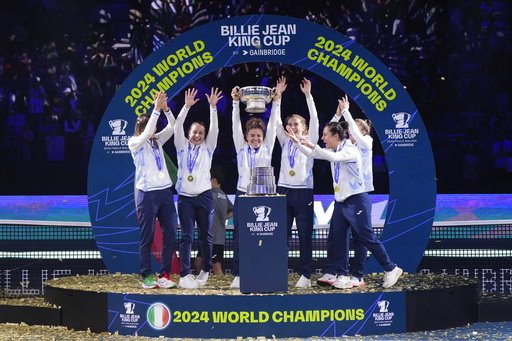
MALAGA, Spain — Rafael Nadal had a deep desire to conclude his career by representing Spain in his homeland, proudly donning the red uniform of the nation’s Davis Cup team.
“Playing for your country brings a unique feeling, and when we succeed, we all share in that victory; conversely, when we face defeat, that burden is also shared,” expressed Nadal, a 22-time Grand Slam champion, the day before his career concluded following Spain’s elimination by the Netherlands in this prestigious tournament.
“The experience of sharing triumphs and defeats is unlike the typical solo experience in this sport.”
The men’s Davis Cup finals, taking place this weekend in the picturesque southern Spanish city, alongside the recently completed women’s Billie Jean King Cup won by Italy, offer tennis players a rare opportunity to partake in collective experiences akin to those typically reserved for professional athletes in sports like soccer, basketball, and football.
This format fosters collaboration toward a shared goal, allowing athletes to both support and celebrate with one another as a unified team while facing challenges together.
“When we represent our country, it’s a significant opportunity, and we definitely feel the weight of that,” noted Alexei Popyrin, an Australian player preparing for a clash against the top-ranked Jannik Sinner and Italy in this weekend’s semifinals after securing a win over the United States.
“We all grew up watching the Davis Cup and aspired to compete in it; it remains a key ambition for us.”
Many players have noted that competing as a team enhances their performance on the court, with various new team formats—including the Laver Cup and ATP Cup—gaining popularity in recent years.
“It’s not just about playing for yourself,” stated Emma Raducanu, the 2021 U.S. Open champion, who is competing with Britain’s team in Malaga.
“Your responsibility expands to everyone else on your team.”
Being part of a team also brings significant camaraderie off the court. Two-time major finalist Jasmine Paolini shared that the Italian team engaged in spirited games of UNO following their evening meals during the Billie Jean King Cup.
Moreover, the palpable joy shared by Sinner and his teammate Matteo Berrettini after securing a doubles victory, which sealed a comeback against Argentina, illustrates the collective euphoria that team competitions can bring.
“Perhaps we’ve grown weary of competing solely for ourselves; these moments are refreshing,” Berrettini reflected.
From a practical perspective, this team structure allows players to remain engaged in a tournament even after facing an individual loss, a rarity in typical knockout competitions.
For instance, despite Lorenzo Musetti’s tough defeat against Francisco Cerúndolo in Italy’s opening match against Argentina, he was still able to cheer for Sinner, who won two matches to turn the tide in Italy’s favor and maintain their chances in the competition.
“The late part of the season is always a challenge, so having teammates to rely on is very encouraging,” said Sinner.
However, the team format is not without its pressures. Athletes may feel the weight of expectation not to disappoint their teammates or the country represented when national anthems resonate at each match’s commencement.
Furthermore, being on the sidelines and cheering for one’s country while unable to impact the match can be quite challenging.
“It’s definitely nerve-wracking. During my teammate Ben Shelton’s match against Australia, I found myself biting my nails to the quick,” reflected Taylor Fritz, the U.S. Open runner-up.
“The nerves just hit harder during team events compared to when I’m out there playing myself.”
